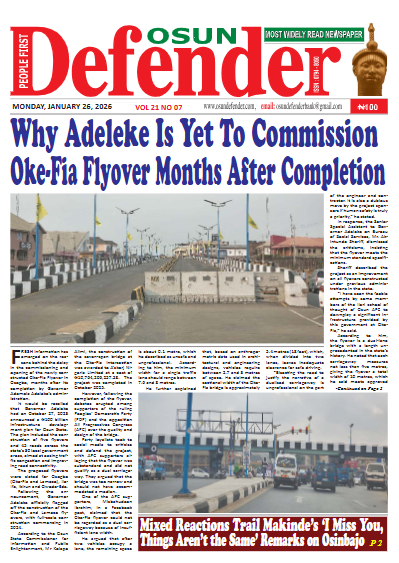EDITORIAL: Need For A Legislative Agenda

TYPICAL of our rent-seeking economy, all eyes are now focused on the jockeying and inevitably the horse trading centered on who gets what as principal officers of the National Assembly. Predictably as peas from a pod same scramble is on at the sub-national level.
What else is new? Nothing surprising same old stuff, for none of the political parties operating at any level had offered anything remotely like a coherent legislative agenda during the recently concluded elections.
This is another confirmation that the main territory of political activity in Nigeria is a perennial hustle to share what is now a shrinking cake, not very much about baking let alone expanding the cake. A discerning electorate would wonder about the need for the legislature arm in the first place. The impolite will be tempted to say that it might be all about excellent by international not even third world standards very good enumeration.
EDITORIAL: A Happy Homecoming!
Alas, there are consequences. For a start, the absence of legislative initiatives inevitably turns what ought to be an independent body into an appendage of the now all powerful dominant executive. The additional debilitation is that even the much touted function of oversight function is pathetic inadequate with predictably disastrous consequences.
As a result, we have that Nigerian peculiarity known as “abandoned projects”, badly formulated and as a consequence inadequately implemented budgets. No wonder one hundred and thirty-three million Nigerian’s are in multi-dimensional poverty.
The legislative arm matters even more now that we are in dire straights. In a polity faced with so many problems, we should be going into post inauguration of a new president on the twenty ninth of May with the convocation of a special legislative summoned to empower the executive with the tools to face what is incontrovertibly a crisis.
Historical examples of such sessions exist notably United States President Franklin Delano Roosevelt and the “hundred days” congress which provided the bills to tackle the great depression and implement the new deal. It was efficacious. In contradistinction, it took unnecessary loss of opportunity and the erosion of the time value of money as well as the opportunity costs to pass vitally needed legislation, such as taking power and railway out of the exclusive legislative list and sensibly into the recurrent list.
Fundamentally, there is also a need to set up a long-delayed Congressional Budget Office to enhance the capacity of the National and the state houses of assemblies in all ramifications.
We can only hope that the inadequacies of the past will be tackled by the incoming parliament.
The painful lesson we have learned from our national predicament is that institutions matter, and to break out of our plight, we have to build strong transparency in our institutions as well as the technical capacity to do the job. The incoming assemblies must be more than the sharing of largess and posts they have to provide the fundamental foundation for a rebirth of the republic.









